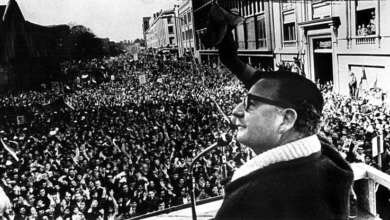The United States has a long history of undermining democratic pro-people’s movements across Latin America. In its quest to protect its interests in the region, the United States has spared no tactic. It has sent arms to right-wing militias, provided funding to topple elected governments,and planted spies and instigators disguised as humanitarian aid workers. According to recently released State Department documents, Bolivia has been no exception.
Recently declassified U.S. State Department documents reveal that the U.S. government worked with Bolivia’s right wing to engineer a coup that installed Hugo Banzer as dictator in 1971. The coup was also supported by fascist Falange militias. The fighting lasted three days, leaving over 100 dead and 600 wounded. It ushered in a period of ruthless repression, during which 90 percent of the people lived in poverty while the ruling elites controlled billions in foreign investment. The United States funded the CIA to support the coup plotters.
After the Banzer coup the United States immediately denied all involvement, but the Washington Post published an article one week later with the headline “U.S. Major Played Role in Bolivian Coup D’ Etat,” and reporting that “conversations here make it clear that a U.S. Airforce Major” served as a military advisor to the coup participants who were training in Santa Cruz. The State Department immediately denied the report.
The recently released documents belie the State Department’s claim. An August 19, 1971, National Security Council memorandum described the military support the United States had provided the coup plotters. The memorandum predicted that a “coup attempt [was] about to get underway in Bolivia,” and suggested that “[i]f this incident does blow up publicly, we will, of course, deny it.” (National Archives) Prior discussions addressed the “White House request that the CIA come up with a political action program to arrest the leftward trend of the Torres regime in volatile Bolivia. …”
Torres, then president of Bolivia, identified himself as a radical socialist. He was perceived as “a man of the people” and was very popular. In the 11 months that he was president, he replaced the National Congress of the elites with a national workers’ assembly and strengthened relations with the Soviet Union.
Far from concerned with workers’ economic control, the United States sought to protect its economic interests in tin mining and oil. The CIA trained Banzer at the School of the Americas in Panama and the Armored Cavalry School in Texas. After the coup, the Nixon administration gave tens of millions of dollars each year to Banzer’s administration.
State Department records show that two months before the coup, National Security Advisor and war criminal Henry Kissinger and President Richard Nixon discussed the need for a coup in Bolivia. Kissinger described the Torres government’s failure to protect U.S. investment as “a major problem in Bolivia.” Nixon responded by asking, “What does Karamessines [the CIA] think we need? A coup?” Kissinger then explained that a coup was an option only if the United States were able to replace the expelled Peace Corps, USAID and military officials.
Now the progressive Morales administration and the Movement toward Socialism is faced with the same intervention and destabilization tactics that the United States has used to overthrow prior pro-people regimes. USAID has continued to support regional elites against the central government ever since Morales’s election in 2005. Two years ago Morales was forced to expel the U.S. envoy for continued destabilization activity.
Morales, the first Indigenous president in a country that is majority Indigenous, has garnered even higher popularity than he had when elected in 2006. His popularity has grown because of the implementation of progressive programs of nationalizing resources and expanding social services.
The same State Department documents show that USAID has been collecting intelligence data for the United States and instigating non-governmental organizations in efforts to destabilize the Morales government. USAID has reported to the U.S. government on ways to strengthen opposition to Evo Morales and the MAS party (Movement toward Socialism) since 2001. USAID also funded right-wing political groupings in Santa Cruz, one of the wealthiest (and whitest) states in Bolivia, where large landowners actively advocate for separation from the federal government. According to the U.S. Embassy, USAID spends $85 million every year to operate in rural Bolivia.
The Obama administration has not supported human rights or democracy in Bolivia any more than preceding U.S. imperialist administrations. Special operations in Latin America, and Bolivia in particular, have expanded under the Obama administration, with special operations increasing by 25 percent in 2009.
To U.S. imperialists Bolivia’s crime is electing a president who reflects the interests of the vast majority over the rule of foreign investment and local elites. True self-determination for the Bolivian people means defending Morales and the peoples’ movement against U.S.-funded efforts to control Bolivia’s vast resources.






